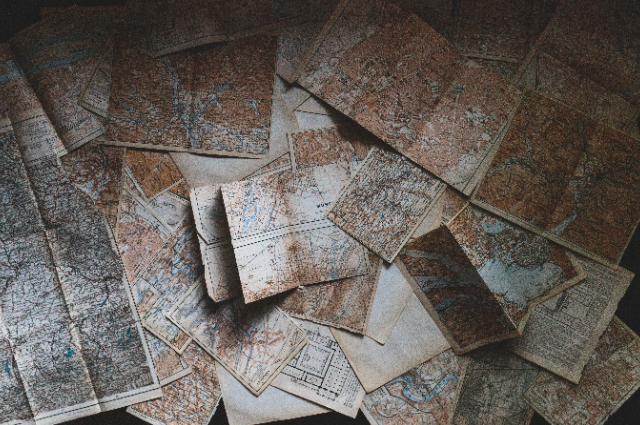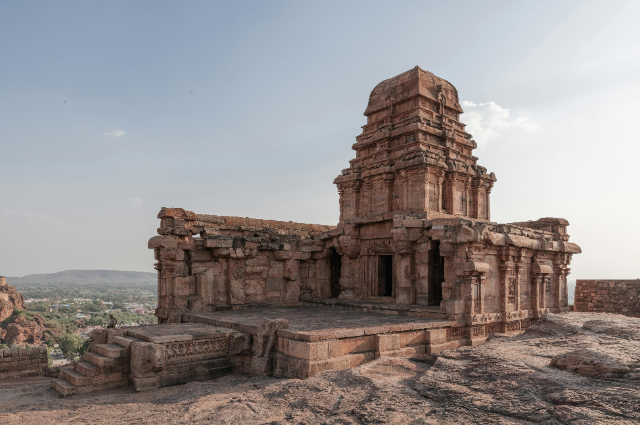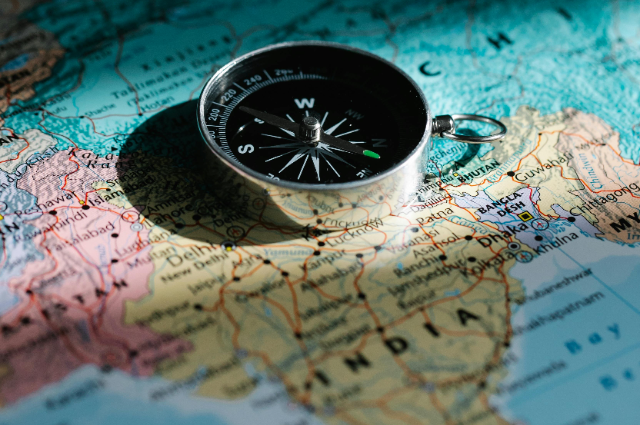
Photo by Andrew Neel on Unsplash
“Who controls the past controls the future. Who controls the present controls the past.” - George Orwell, 1984
The year is 1984, the country of Oceania is under a totalitarian regime, and history is now fiction rather than fact. The aeroplane was not invented by the Wright brothers anymore but by the ruling party itself. Anyone who goes against the ruling party, quite simply, must perish. Orwell's 1984 chillingly describes the world under a dystopian government where the ruling party maintains control by constantly rewriting history, erasing inconvenient truths, and manufacturing new narratives that serve its interests. History has never been neutral, as seen in the book, which raises the question of whether the history we know is inherently neutral or not.
History is political. It is shaped by those in power, those with power to control the narrative, and backed by the ones who want to be in power. The news of today becomes the history of tomorrow. The victor in the war decides the narrative of the war. The loser in the same war narrates the story of a fight bravely fought. Throughout history, we often come across contradictory stories or narrations of the same events. Who decides what is true? Every nation builds its identity based on its historical past. Every nation has a 'collective memory.' These collective memories come from textbooks, novels, writings, movies, music and other pieces of media. Whoever holds the reins of power chooses the memories to be remembered by the collective. They decide which parts to highlight—victories over enemies, founding myths, heroic figures—and which to gloss over: defeats, atrocities, inconvenient truths.
The Politics of Memory
History is not simply a collection of facts about the past. It is a process of selection, interpretation, and narrative-building. Historians must decide which events are significant, which perspectives to prioritize, and how to make sense of limited and often contradictory evidence. These choices are inevitably influenced by the historian's own cultural context, values, and assumptions. The organization of collective memories, the means by which political events are remembered, recorded, or discarded, refers to the politics of memory.

Photo by Erika Fletcher on Unsplash
Rewriting the Past: Textbook revisions
One of the most direct and important ways to direct history to fit a narrative is through education. A student who is ignorant of past injustices may never be able to question present inequalities. In recent years, India has witnessed multiple changes in curriculum and school textbooks. Under the present government, the National Council of Educational Research and Training (NCERT), which designs the curriculum for most schools in India, has made significant changes to its history textbooks. Mughals, who once ruled India for almost 235 years and have been part of its history, have been recast in a more negative light. Entire chapters related to Mughal history have been omitted. The achievements of Mughal emperors, such as Akbar, who promoted religious tolerance and cultural syncretism, are undervalued. Instead, the focus has shifted towards their military campaigns, with an emphasis on their conflicts with Hindus. The 1975 Emergency, when Indira Gandhi suspended civil liberties and cracked down on political opposition, is either omitted or presented in a very neutral light. References to the 2002 Gujarat riots and the 1992 Babri Masjid demolition were removed or rephrased in neutral terms, omitting details of political mobilization and human impact. This omission of key historical events shapes how students understand democratic freedoms and political dissent in India. These revisions have sparked widespread controversy, with critics accusing the government of using the education system to push a Hindu nationalist agenda.
On a global scale, similar changes are happening and have taken place before. Japan, in its textbooks, has altered the truth of its wartime actions. The 1937 Nanjing Massacre, where Japanese troops killed an estimated 300,000 Chinese civilians, is frequently minimized or overlooked in Japanese textbooks. These textbooks contain no mention of Imperial Japan's 'comfort women' system, which forced women and girls into mass sexual enslavement. This has led to strained relations between Japan and its neighbours, especially China and South Korea, who demand a more honest reckoning with Japan's war crimes.
In 2018, Poland's ruling Law and Justice party passed an amendment making it a crime punishable by up to three years in prison to "publicly and falsely" attribute Nazi crimes to the Polish nation or state, effectively prohibiting the use of terms such as "Polish death camps" and any discussion of Polish complicity in Holocaust atrocities. Textbook authors and academics self-censored, omitting documented instances of Polish collaboration in Nazi atrocities to cast Poles exclusively as victims, under the threat of criminal penalties that chilled educators and researchers alike.
To put it plainly: history is being weaponized through the curriculum. By revising textbooks, politicians control what the next generation will see as the truth about their country's history. The radical manipulation and selective elimination of historical topics leads to half-knowledge about various important historical events. As it is rightly said, half-knowledge is a dangerous thing. These textbook revisions, which are devoid of events that may generate questions in a student's mind, risk depriving the future generation of critical thinking skills.
Academic Institutions and Historical Research
The politicization of history extends to academic institutions as well. Critics have raised concerns about political interference in the functioning of historically independent bodies like the Indian Council of Historical Research. Appointments to such institutions have sometimes favoured scholars aligned with Hindu nationalist perspectives, potentially influencing research priorities and historical interpretations. There have been increased efforts to provide "scientific evidence" for mythological narratives from Hindu texts, such as the existence of the Saraswati River mentioned in Vedic literature. These efforts blur the lines between mythology and history, using archaeological and geological research to support religious and nationalist narratives. Finding factual evidence for such mythological events is perfectly acceptable, but it is crucial to ensure that other mythological events or religions have the same funding and research opportunities.

Monuments and Public Spaces
The renaming of streets, cities, and landmarks represents another front in India's historical narrative wars. Since 2014, numerous places with Muslim or colonial names have been renamed to reflect Hindu history or mythology. Allahabad became Prayagraj, Mughalsarai Junction railway station was renamed after Deendayal Upadhyaya and Aurangzeb Road in New Delhi became APJ Abdul Kalam Road. The Mughalsarai Junction, a 163-year-old station, was renamed for RSS thinker Deen Dayal Upadhyaya in a ceremony led by the state's chief minister, reframing a Mughal-era landmark as modern Hindu-nationalist iconography.
Globally, there have been similar events too. In Türkiye, dozens of Christian and Armenian place names were changed to Turkish ones, downplaying minority histories. In the USA, towns and institutions named after Confederate figures face renaming amid debates over slavery's legacy. A similar event took place in the UK when Oxford's Oriel College removed Cecil Rhodes's statue, sparking fierce arguments over erasing history versus correcting a racist past. These changes are not merely cosmetic—they reflect an effort to reshape public memory and national identity. As sociologist Nandini Sundar observes, "The renaming of cities, streets, and institutions is part of a larger project to reconfigure public space in ways that marginalize certain histories and communities while centring others."
Digital Archives and History
The concept of a "memory hole" in 1984 envisioned physical documents fed into flames. Today, the furnace is digital and physical. Governments and agencies exploit web-based platforms to remove content, believing few will notice.
The Internet is full of information. Information of the present will become the history of the future. By keeping a check on the information available on the Internet, governments regulate and moderate information that might be circulating. While it is important to have regulation over the content one sees on the Internet, governments also exploit their powers by removing content that may not meet their political motives. One such example happened in early 2025, when the Trump administration ordered federal agencies to purge LGBTQ+ and civil-rights content—removing Stonewall Uprising pages, transgender-health resources, and Census gender-identity data—leaving only Internet Archive traces of these records. It has been documented that federal websites across the NIH, Department of Education, and USAID were stripped of LGBTQ+ content, prompting advocates to warn of an erasure of vital historical and policy records.
Similarly, China has always been a big believer in purging content that does not match its politics. The government censors content for mainly political reasons, such as curtailing political opposition and censoring events unfavourable to the CCP (Chinese Communist Party), such as the 1989 Tiananmen Square protests and massacre, pro-democracy movements in China, the persecution of Uyghurs in China, human rights in Tibet, Falun Gong, pro-democracy protests in Hong Kong, and aspects of the COVID-19 pandemic. The government has censorship over all media capable of reaching a wide audience. This includes television, print media, radio, film, theatre, text messaging, instant messaging, video games, literature, and the Internet.
Historical Narratives of War
Perhaps nowhere is the political nature of history more evident than in accounts of warfare, where the saying "history is written by the victors" often rings true. Competingly different narratives emerge depending on which side is telling the story, with profound implications for national identity and collective memory.
The Atomic Bombings: American and Japanese Perspectives
The 1945 bombings of Hiroshima and Nagasaki explain this difference starkly. In American narratives, the bombings are seen as necessary measures that had to be undertaken in order to shorten the war and save lives by avoiding a costly invasion of Japan. When the Smithsonian Museum planned an exhibit of the aircraft that dropped the first atomic bomb, veterans and politicians objected to content they saw as too sympathetic to Japan and critical of the decision to use nuclear weapons. As a result, the Smithsonian Museum had to change the narrative of the entire exhibit.
In contrast, Japanese accounts focus on civilian suffering and the unprecedented destructiveness of nuclear weapons. The Hiroshima Peace Memorial Museum centers on the experiences of victims and survivors, presenting the bombings as humanitarian catastrophes and arguing for nuclear disarmament. These contrasting narratives reflect different national interests and collective memories, showing how the same historical events can be interpreted in radically different ways. As historian John Dower notes, "In America, the imagery of 'ground zero' was wiped away by new images of nuclear annihilation during the Cold War... By contrast, in Japan, the atomic bombings remain, to the present day, a singular horror."

The India-Pakistan Partition
The 1947 Partition of India offers another powerful example of competing historical narratives. In Indian nationalist accounts, Partition is often portrayed as a tragic but necessary price for independence, with blame placed on British divide-and-rule policies and Muslim League separatism. Pakistani narratives, conversely, present Partition as the inevitable outcome of Hindu-Muslim differences and the creation of a homeland where Muslims could live free from Hindu domination. The human cost of Partition—with estimates of up to two million deaths and 14 million displaced—is often minimized in official narratives on both sides, which instead emphasize national liberation and independence.
Vietnam War: American and Vietnamese Perspectives
The Vietnam War (or the American War, as it is called in Vietnam) demonstrates how a single event may produce vastly divergent historical narratives. American interpretations have altered over time, from early Cold War framings of the fight as a necessary stand against communist expansion to later tales emphasizing American errors, the toll on soldiers, and questions about the war's purpose. Vietnamese official history, notably in the north, depicts the fight as a patriotic struggle for national liberation against foreign imperialists—first the French, then the Americans. The War Remnants Museum in Ho Chi Minh City exhibits graphic documentation of American military acts and their consequences, emphasizing Vietnamese suffering in ways that are rarely seen in American accounts.
The history you know has always been political
No neutral account of history has ever existed. Even a historian's own opinions can be prejudiced or biased by his beliefs, faith, religion, values, and other factors. By consulting diverse sources, including those from different political perspectives, cultural backgrounds, and disciplinary approaches, we can develop a more nuanced understanding of historical events. When encountering historical narratives, ask, Who created this account? What interests might they serve? Whose perspectives are centred, and whose are marginalized? What evidence supports these claims, and what might challenge them? This also applies to present-day events. When consulting one piece of media as a source of information, be wary of prejudice or bias in the report. Countries like India, Afghanistan, and China are ranked very low on the World Press Freedom Index and rarely have a neutral or open account of current events. History rarely offers simple heroes and villains or clear moral lessons. Embracing complexity and ambiguity is essential for a mature understanding of the past as well as the present. These battles of historical narratives, and especially the ones that are presented, matter not because there is a single correct version of history that must be defended, but because how we remember the past shapes who we are and what we might become. A democratic approach to history would not claim perfect objectivity or impartiality, but would instead value multiplicity, admitting that diverse perspectives can provide light on different elements of the past. It would acknowledge that marginalized people have frequently been left out of official history and that recovering their tales does not politicize history but rather makes it more complete. Recognizing history's political aspect allows us to deal with it more honestly and critically, avoiding naive belief in objective history and cynical acceptance of history as simple propaganda.
In Orwell's 1984, our protagonist, Winston Smith, altered newspaper stories at the Ministry of Truth, altering history to support the Party's constantly changing narrative. Today, we confront our own sophisticated reality in textbooks, museums, and digital archives. When governments remove chapters from textbooks, nations conceal their atrocities, and digital archives of oppressed people mysteriously disappear, we see Orwell's prediction come true. The year is no longer 1984, but as history becomes increasingly weaponized across countries, our most revolutionary act may simply be to question.
. . .
References:
- Orwell, G. (1949). Nineteen Eighty-Four. Secker & Warburg.
- Politics of memory. (n.d.). In Wikipedia. Retrieved from https://en.wikipedia.org/wiki/Politics_of_memory
- Saffronisation. (n.d.). In Wikipedia. Retrieved from https://en.wikipedia.org/wiki/Saffronisation
- 4. Reuters. (2017, April 10). China lodges protest with Japan over new text books. Reuters. Retrieved from https://www.reuters
- 5. Japanese history textbook controversies. (n.d.). In Wikipedia. Retrieved from https://en.wikipedia.org/wiki
- 6. Reuters. (2018, February 7). Polish president signs Holocaust bill, triggers Israeli, U.S. criticism. Reuters. Retrieved from https://www.reuters.com
- 7. Associated Press. (2025, January 31). Health data, entire pages wiped from federal websites as Trump officials target ‘gender ideology’. AP News. Retrieved from https://apnews.com
- 8. Human Rights Watch. (2009, May 13). The Tiananmen Legacy. Retrieved from https://www.hrw.org
- 9. Pandit Deen Dayal Upadhyaya Junction railway station. (n.d.).
In Wikipedia. Retrieved from https://en.wikipedia.org - 10. Kindy, D. (2020, July 30). Why the Enola Gay, the plane that dropped the first atomic bomb, will always inspire debate. Smithsonian Magazine. Retrieved from smithsonianmag
- 11. Partition of India. (n.d.). In Wikipedia. Retrieved April 29,
2025, from https://en.wikipedia.org - 12. Tewari, M. (2023, January 21). How the ICHR Is ‘Inventing History’ Under the Modi Government. The Wire. Retrieved from https://thewire.in/communalism
